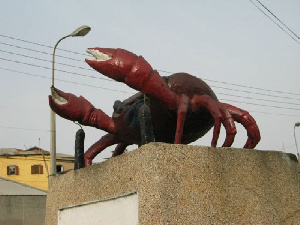Meet the Cape Coast King who challenged the legitimacy of British authority


It is on record that King John Aggrey Essien of Oguaa (Cape Coast) was the first king in the 19th century to really have challenged the legitimacy of British authority.
Organizing systematic protests against the British earned him the accolade as one of the
African political martyrs of British imperialism, but not the first king of Cape Coast.
King John Aggrey is a personality who thus seems to have been relegated to the background
despite his outspokenness and relentless opposition to colonial rule.
He is not often mentioned orally or in books, ranks a golden place among the Heroes of the Gold Coast.
His contribution to the independence struggle is Great.
Background
King John Aggrey was born in Cape Coast in about 1809, his father being King Joseph Aggrey (Burupu) of Cape Coast.
It was an era of great political unrest and turbulence in the Gold Coast, particularly Cape Coast, and the seat of British administration in the country at the time.
His father, King Joseph Aggrey (Burupu) died in 1851 and was succeeded by Kofi Amissa as from that time.
Charging with the offence of attempting suicide, King Kofi Amissa came under heavy fire from the people of Cape Coast, who now became more than ever determined to depose him (Order- in Council of 4th April, 1856 and the African Times of 23rd March, 1865) but this move was resisted by the Judicial Assessor who was appointed Chief Justice, Mr. J.C.
Fitzpatrick, who stated that that ‘a king could not be destooled without the consent of the Governor, and he refused to recognized the Regent Mr. J.R. Thompson, whom the townsmen meanwhile put in the king’s place.
(Ref: Cape Coast Memorial of 5th January, 1865, endorsed in a Dispatch No. 2 of 6th January, 1855 from Governor Connor to Sir G. Grey; Co/ 96/ 83).
Enstoolment of King John Aggrey
Troubles had still not abated when on February, 1865, John Aggrey was elected king, an appointment which was soon approved by the Governor, Richard Pine.
In a Dispatch to the colonial office, the Governor commented on the new king’s installment as follows:
“For the first time in the annals of Cape Coast, without the usual semi-barbaric shouts, yells, clapping of hands and firing muskets “a king was installed in Cape Coast.
King John Aggrey of Cape Coast gave the British authorities a hard and difficult time.
The importance of Aggrey’s rule is massive, and cannot be argued.
He was a man of great determination and also strong feelings against any violation on African traditional authority by any foreign ruler, either directly or indirectly.
The installation of King John Aggrey of Cape Coast helped intensify the coastal people’s resistance in the 1860s.
King Aggrey also allied with educated Africans and challenged the basis of British power and jurisdiction in Ghana.
He resisted the sending of cases from his court to the British courts on appeal, and refused to accept the people of Cape Coast and other areas as being subjects of the British.
He also refused to sign a document giving the area around the Cape Coast Castle to the British.
Exile
So many things happened to him but never did he give in or surrendered.
He was apprehended, and exile to Sierra Leone, the Home Government, however, appeared
uneasy about his exile as there was apparently no power to trial King John Aggrey in Sierra Leone.
In Sierra Leone, he was kept for two years from January, 1867 to March, 1869, until he became ill and hurriedly repatriated by the authority.
Upon his return, King John Aggrey renounced his claim to be king. He was given an annual pension of £100 then for life, subject to good behaviour.
He thus lived as a private person in Cape Coast until his demise later in the same year of 1869.
The treatment meted out to King John Aggrey of Cape Coast was also an important factor in the formation of the Fante Confederation.
As British power grew in stature, so did the people’s resistance to it.
Source: ghanaianmuseum.com





